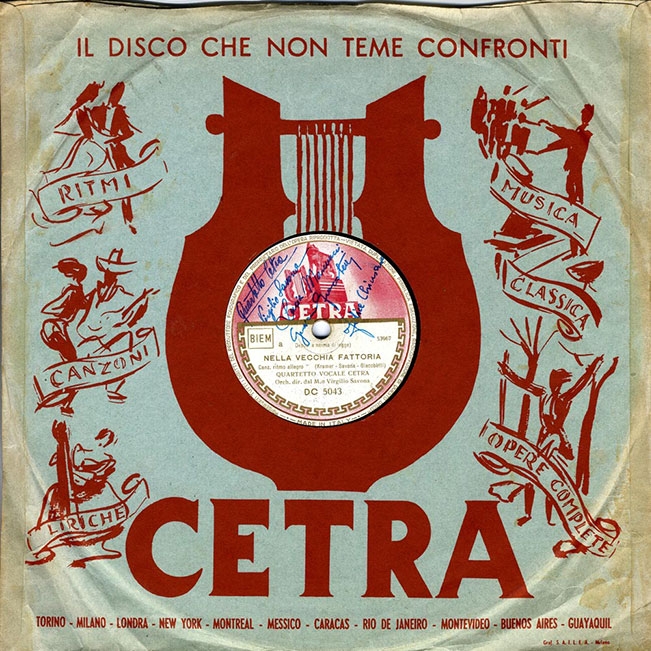Nella vecchia fattoria

However, the truly big hit of 1949 was a song that really boosted our popularity. The director of the record label Cetra had asked us to record four songs written especially for children, to be included in a double album (a 78rpm, as they still were at the time) for Christmas. Tata and I immediately got in touch with Kramer and churned out the first three songs: Il trenino dei sogni [the train of dreams] (with a locomotive and carriages made of cream and chocolate), I tre alberi e la casetta [The three trees and the little house] (an unpretentious little song about the protection of the environment) and La lampada di Aladino [Aladino’s lamp] (a retelling of the ancient fairy tale with the addition of a certain “Kamo-Kimo cinesino”). At this point I was about to propose a fourth little song called Cappuccetto Giallo [Little Yellow Riding Hood], when Tata pulled a record out of a folder and interrupted me: “One moment”, he said, “at the Porta Portese market in Rome, I found this record by Nat King Cole with a little children’s song entitled Old Mac Donald Had A Farm. Listen to this!”
We listened to it a few times, added a riff that wasn’t in the original tune, wrote a few verses that were only partly similar to the English original, and changed the arrangement by going up a semitone at the beginning of each stanza. This is how Nella vecchia fattoria came about, a song that over time would sell an incalculable number of records and be known all over the world in our particular reworked version, which even made it into Frank Sinatra’s recordings. I talk about reworking because, in reality, it was an ancient Irish folk song exported to America by the first emigrants at the end of the nineteenth century. Nella vecchia fattoria would follow us – or perhaps it would be better to say, haunted us – throughout our entire career. Whether we were in Italy or abroad, we could no longer exempt ourselves from singing it at the end of every single recital. Along the way we would enrich it with little impromptu gags that came up night after night on stage, following the oldest canons of the commedia dell’arte.
Excerpt from: Savona, Virgilio – Gli Indimenticabili Cetra – Milano, Sperling & Kupfer, 1992, pp. 163-164
